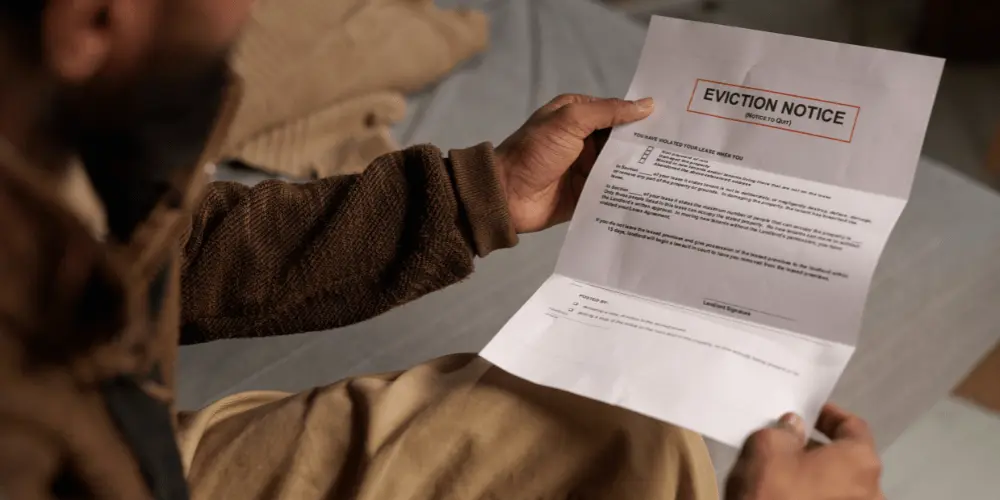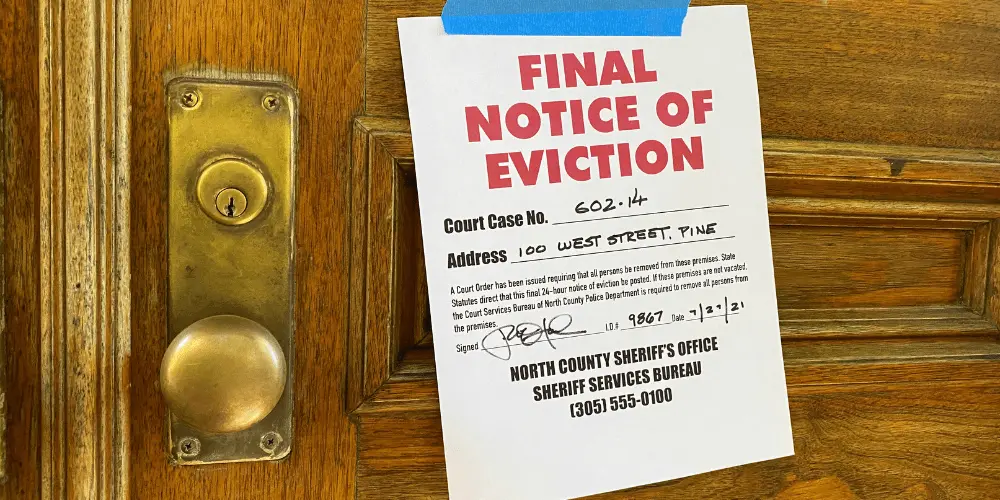
When a renter receives an eviction notice, the clock starts ticking. An eviction notice is the first legal step in the eviction process. It outlines why your landlord wants you to leave, how long you have to fix the problem, and what will happen if you do not act.
Most states require landlords to deliver notices in writing, sometimes by certified mail. Deadlines can vary, but you may have as few as three days to respond. Knowing your time period is the key to protecting your rights and avoiding eviction.
Visit USA.gov’s eviction help page for a simple overview of how notices and timelines work in most states.
Eviction notices must state a reason. Common reasons include unpaid rent, lease violations such as keeping a pet in a no-pet unit, or damaging the rental property. Sometimes landlords also file for eviction due to back rent, rental arrears, or repeated late fees.
Read this section of your notice carefully. If it lists lease violations, compare the claim to your lease agreement or written lease. Make sure the violation matches your rental obligations. If the reason is unpaid rent, look at how much rent owed is claimed and whether late fees are added.
Every notice includes a date by which you must act. Write that date down and circle it. Courts do not excuse missed deadlines. Save copies of the notice, either in paper or as a scanned report. You may also want to send yourself a copy by email so you can show evidence that you received it.
Many renters panic when they hear the words eviction process, but understanding the steps makes it easier to respond. The process generally follows the same pattern:
Each step gives you an opportunity to respond, pay rent, or seek help.
If you receive a court date, act immediately. Mark the date on your calendar. Gather your lease agreement, payment receipts, and any letters you have sent or received. Courts want to see evidence. File forms if required, and ask the court clerk if you have additional questions.
An eviction lawsuit is sometimes called an unlawful detainer. You must respond in writing, often within a few days. Use the forms provided by the local court. If you fail to respond, the landlord automatically wins by default judgment. Make sure to provide your current address, sign the forms, and file them by the deadline.
One of the best ways to prevent eviction is to pay rent or at least show good faith that you are trying. Even partial payments can make a difference.
Pick up the phone and call your landlord. Tell them why you fell behind and how you plan to catch up. Follow up with a written letter or email. Offer to pay what you can now and spread the rest over the next month or two. Many landlords prefer steady payments over filing in court, since filing takes time and money.
Sometimes landlords will accept partial rent plus a written plan. You can also ask if late fees or other charges can be waived. This shows good faith and reduces your balance. Keep receipts of all payments, no matter how small.
For more strategies, see Credit.org’s guide on what to do if you’re behind on rent.
Emergency rental assistance, or ERA, is one of the strongest tools renters have to stop eviction. These programs cover back rent, rental arrears, utilities, and sometimes even security deposits.
Gather these documents before applying:
Programs may also accept self attestation for certain hardships. Always ask what documentation is required.

Most programs now use an application portal. Create an account, upload documents, and check your status daily. Submit all forms on time and keep a record of everything you send. Respond quickly if providers request additional questions or evidence.
The emergency rental assistance program, often called ERA, was created by the federal government during the pandemic. Funds were distributed to state and local governments, who then set up their own portals and application rules. These programs still exist in many areas, even if funding is limited.
Visit the U.S. Treasury’s ERA program overview for details on how it operates.
Credit.org also offers a resource on emergency rental assistance programs you can apply for now.
ERA programs vary by state or territory, but most share common rules. They typically require households to earn below a certain income limit, often tied to area median income. Eligible households may include those who can show financial hardship, housing instability, or a risk of eviction.
Funds may cover back rent, utility bills, and sometimes forward rent. The program often pays landlords directly, although some allow funds to go to tenants.
If ERA funding is not available or has run out, other rental assistance programs may help. Local governments, nonprofits, and faith-based groups often run rental assistance programs. You can also call 211.org to find resources in your community.
Credit.org has a guide with five immediate solutions if you cannot pay rent this month.
Utility bills can be just as overwhelming as rent. Some states allow rental assistance programs to cover utility arrears as part of housing costs.
Households may also qualify for utility-specific financial assistance, such as the LIHEAP program. This program helps pay heating and cooling costs and can prevent utility shutoffs.
If your case reaches the court stage, preparation matters. Judges want to see that you acted in good faith, applied for programs, and communicated with your landlord.
Create a short timeline of actions you have taken since receiving the eviction notice. Include dates you applied for rental assistance, amounts you paid, and any letters you sent to your landlord. Bring reports or receipts to show these steps.
Always communicate in writing, whether through letters, emails, or text messages. Save copies of everything. If you speak on the phone, write down the date, time, and summary of the call. Courts value evidence that you made an effort to resolve the problem.
If your landlord has already filed for eviction, you still have rights. Courts will give you a chance to respond, and having legal help can make a big difference. Many states provide free or low-cost attorneys for tenants, and legal aid groups specialize in housing cases.
Check LawHelp.org for local legal aid, or review the CFPB’s help for renters facing eviction.
Credit.org also explains what to say to your landlord if you are facing eviction, which can help you negotiate while the case is pending.
Sometimes landlords make mistakes when filing eviction cases. A notice may have the wrong address, list the wrong tenant, or demand amounts not supported by the lease. Payment disputes are also common, especially if partial rent was accepted. If the eviction is based on lease violations, check that the violation matches your written lease or rental agreement.
If the judge rules against you, you may still be able to appeal. Appeals often require quick action, sometimes within a few days. You can also ask the judge for more time to move out. Explain your situation and provide documentation of applications for assistance, health concerns, or other hardships.
Rental assistance programs use income limits to decide eligibility. Many are based on area median income for your state or county. Programs may ask for tax returns, pay stubs, or self attestation forms. Some programs require a social security number, while others accept alternate IDs.
When your application is approved, confirm whether the payment will go directly to your landlord or to you. Ask for a written report or letter that shows the payment date and amount. Keep this documentation for court.
Denials are often due to missing documents or incomplete forms. If you are denied, review the notice carefully and provide any additional questions or documents requested. Apply again as soon as you correct the problem.
Your landlord may need to cooperate with the program before funds are released. Clear communication helps prevent delays.
Credit.org’s guide on renters’ rights when facing eviction offers helpful tips for these conversations.
You can send a short letter that says: “I applied for emergency rental assistance on [date]. My case number is [number]. The program told me funds may be issued by [date]. Please confirm that you will pause eviction while this is processed.”
Include a simple plan in your message, such as paying part of the arrears now and the rest after assistance funds arrive. Showing effort may convince the landlord to wait instead of moving forward with eviction.
Applications are often delayed because of errors. Avoid these mistakes by double-checking every form before submitting.
Make sure your application matches your lease. Use the correct rental property address, property owner name, and rent amounts. Incorrect information can cause delays or denials.
When providers ask for documents or clarification, respond quickly. Many programs close cases if you do not reply in time. Save every email, report, or form you send.
If the landlord wins in court, the judge will issue a judgment of possession. This does not always mean you must leave immediately. You may still have options.
Judges sometimes grant tenants extra time to move, especially if children, seniors, or medical needs are involved. Ask respectfully for additional days and explain your situation. Having a request in writing makes it easier for the judge to approve.
If you move out, keep receipts of any payments made and request a final written notice showing that you vacated. This helps protect you if the landlord later claims more money is owed.
Once the case is resolved, focus on preventing future problems. Building financial stability reduces the risk of eviction down the road.
Automating rent and utility payments ensures they are made on time. Even small steps like phone reminders or bank auto-pay can prevent missed due dates.
Many communities operate rental assistance programs beyond ERA. These programs may provide monthly subsidies or help with utility costs. Call your local housing office or visit 211.org to explore what is available.
Here is a clear order of steps to take if you receive an eviction notice:
For more details on your rights, see Credit.org’s guide to renters’ rights when facing eviction.
Facing eviction is overwhelming, but you do not have to do it alone. Housing counselors can walk you through applications, help you create a budget, and support you in communicating with your landlord.
Credit.org’s Rent4Recovery Distressed Renter Counseling offers free help for tenants in crisis. Counselors can provide advice, connect you to resources, and guide you through the eviction process.
Get help today at Rent4Recovery Counseling.